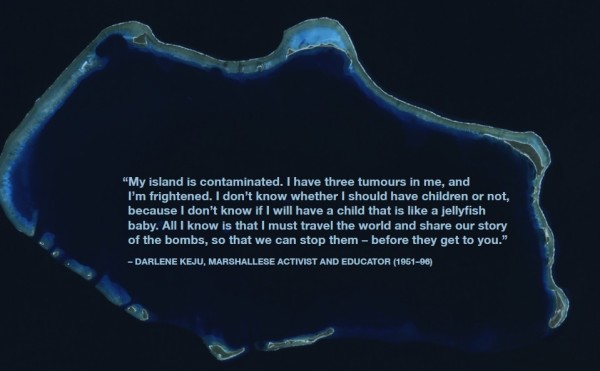The International Campaign to Abolish Nuclear Weapons (ICAN) is encouraging all Pacific Island nations to attend the Second Conference on the Humanitarian Impact of Nuclear Weapons, to be held in Mexico next month, and use this opportunity to share their experiences of the devastating effects of nuclear testing in the region.
ICAN today released a report that details the ongoing humanitarian impact of the tests. This year marks the 60th anniversary of the infamous “Bravo” nuclear test at Bikini Atoll in the Marshall Islands, which spread radioactive fallout over inhabited islands. From 1946 until 1996, more than 315 nuclear test explosions were conducted across the region by France, Britain and the United States.
Download report: Banning Nuclear Weapons: A Pacific Islands Perspective
The nuclear test explosions have added to the global cancer burden. Hazards were greatest for the military and civilian personnel who staffed the test sites, as well as villagers living on nearby and downwind islands. Years later, many of these nuclear survivors are suffering health problems related to their exposure to radiation.
The Second Conference on the Humanitarian Impact of Nuclear Weapons, from 13 to 14 February in the Mexican state of Nayarit, is a follow-up to the Oslo Conference on the Humanitarian Impact of Nuclear Weapons that took place in March 2013. That conference helped build momentum for negotiations on a treaty banning nuclear weapons.
The author of the report, Nic Maclellan, said: “Pacific island nations – which understand all too well the horrific effects of nuclear weapons – are perfectly placed to play a leadership role in the process to negotiate a ban on nuclear weapons, which will help ensure that no one else suffers as they have suffered.”
He added: “So long as nuclear weapons exist, there is a real danger they will be used again – whether by accident or design – and the consequences will be catastrophic. A treaty banning these worst weapons of terror and mass destruction is urgently needed.”
Rev. François Pihaatae, General Secretary of the Pacific Conference of Churches, wrote in the foreword to the report: “It is necessary that our regional leaders – secular and faith-based – recognise the threats of nuclear weapons and speak forcefully for a ban. In international forums, including conferences on the humanitarian impact of nuclear weapons, the Pacific must speak with a united voice.”










